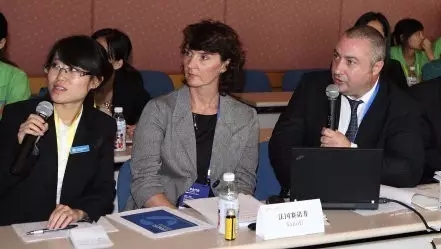Conference system application method that 99% of users will ignore
Meetings are an important way for companies to make operational decisions. A feature-rich meeting system has long been an essential part of the meeting room. A suitable conference system can make the conference convenient and efficient. However, in the face of a wide range of conference products on the market, how to choose the conference system that suits you best?
The current conference system is very rich in functions, including conference discussions, voting, simultaneous interpretation, check-in management, and so on. For some enterprises, in addition to meeting the internal decision-making use, the conference room will occasionally have foreign visitors to visit and exchange, and need language translation. For such users, choosing what type of conferencing system may be a painful and tangled process. If you use the ordinary purely discussed conference system , you need to lag the translation when you communicate with the foreign guests. After the foreign guests finish speaking, the translator can translate, and vice versa, which wastes a lot of time invisibly, which can be ended in 2 hours. It takes 4 hours for the conference to end; if the conference system with simultaneous interpretation is used, the simultaneous interpretation rate is low, and the cost of simultaneous interpretation equipment is often higher than that of purely discussed equipment, resulting in unnecessary Waste.

In fact, we don't have to worry about it. There is a way to apply the conference system to most users, and the conference system with pure discussion can also play a new height. The 1+1 simultaneous interpretation application is implemented using a conference system that does not have simultaneous interpretation capabilities, and is particularly suitable for conference rooms that have only one translation language and need to control costs. To implement the 1+1 simultaneous interpretation application, the conference system requires the following two conditions:
1. The headphone jack of the microphone unit can select the source.
2. The microphone units can be grouped freely.

There are not many conference systems on the market that can meet two conditions at the same time. The Beyerdynamic Quinta wireless conference system is one of them.
Quitna is a wireless conference system . It is more convenient to use without wires. Quinta supports three frequency bands of 2.4, 5.2 and 5.8 GHz. It can automatically detect interference and switch to interference-free frequency band to ensure system stability. Sex. The microphone unit of the Quinta Wireless Conference System supports free grouping and can be divided into up to 4 groups. The source of the microphone unit's headphone jack is freely selectable (mixed, all microphone units, 1 / 2 / 3 / 4 sets of microphones).

In this way, we can set the speaking unit and the translation unit in different groups, and then select the microphone interface of the microphone unit to receive the signal of the group in which the translation unit is located. In this way, the earphone can be connected to the headphone interface of the speaking unit to listen to the real-time translation. The translator accesses the headset to listen to the signal of the speaking unit at the headphone jack on the front panel of the conference host.
Guangzhou Yunge Tianhong Electronic Technology Co., Ltd , http://www.e-cigaretteyfactory.com